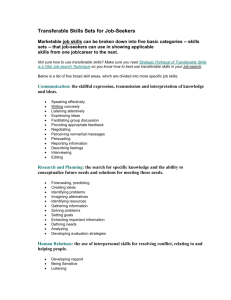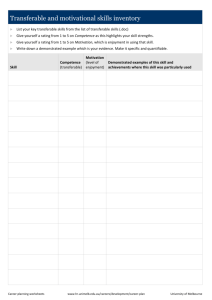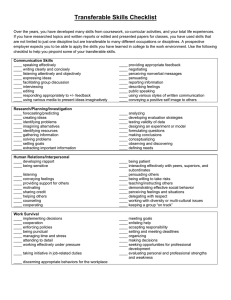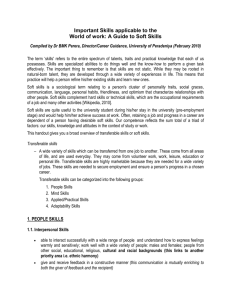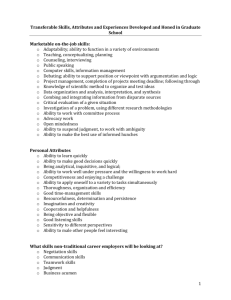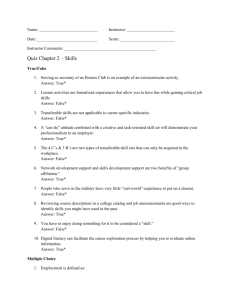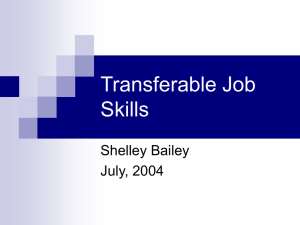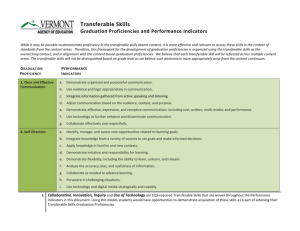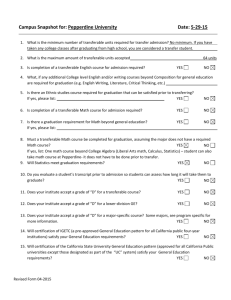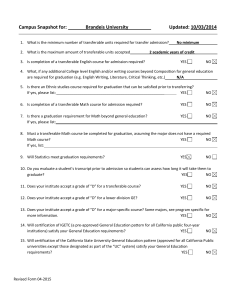Career Planning Transferable Skills - A-PLUS
advertisement
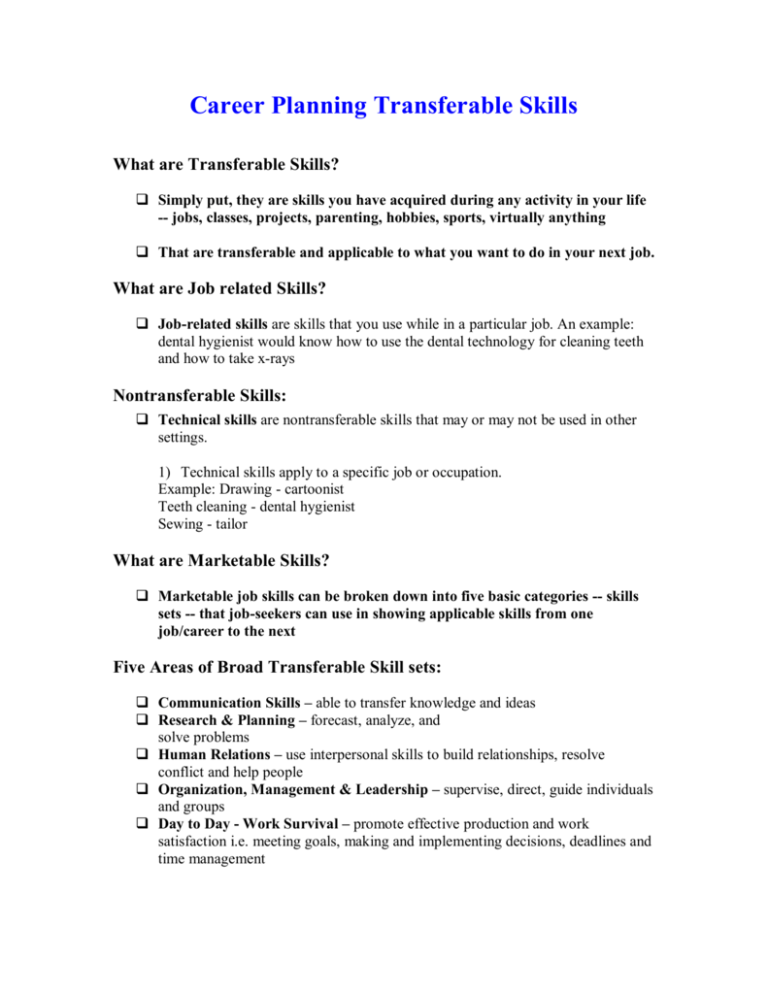
Career Planning Transferable Skills What are Transferable Skills? Simply put, they are skills you have acquired during any activity in your life -- jobs, classes, projects, parenting, hobbies, sports, virtually anything That are transferable and applicable to what you want to do in your next job. What are Job related Skills? Job-related skills are skills that you use while in a particular job. An example: dental hygienist would know how to use the dental technology for cleaning teeth and how to take x-rays Nontransferable Skills: Technical skills are nontransferable skills that may or may not be used in other settings. 1) Technical skills apply to a specific job or occupation. Example: Drawing - cartoonist Teeth cleaning - dental hygienist Sewing - tailor What are Marketable Skills? Marketable job skills can be broken down into five basic categories -- skills sets -- that job-seekers can use in showing applicable skills from one job/career to the next Five Areas of Broad Transferable Skill sets: Communication Skills – able to transfer knowledge and ideas Research & Planning – forecast, analyze, and solve problems Human Relations – use interpersonal skills to build relationships, resolve conflict and help people Organization, Management & Leadership – supervise, direct, guide individuals and groups Day to Day - Work Survival – promote effective production and work satisfaction i.e. meeting goals, making and implementing decisions, deadlines and time management Why are Transferable Skills Important? Bottom line: Transferable skills are essential for success in the competitive market place that we are in now. These are the skills that are applicable from job to job and to a variety of work settings. Leveraging Transferable Skills – Resume Makeover From Secretary/Administrative Assistant to Account Representative Administrative Sales DO: Emphasize sales, customer service, interpersonal, and communication skills State: Interact with a wide variety of personalities and management levels to schedule meetings and make travel arrangements. DON’T: Emphasize administrative experience Computer experience State: Schedule meetings and appointments and coordinate travel arrangements. Listing of Transferable Skills: Plan and arrange events and activities Delegate responsibility Motivate others Attention to visual detail Assess and evaluate my own and the work of others Deal with obstacles, crises / troubleshoot Multi-task Present written material Present material orally Manage time effectively Repair equipment or machinery Keep records / finance / budget Handle complaints / customer service Coordinate fundraising activities Build or construct Design buildings, furniture, historical archives (scrapbooking) Manage finances Speak a foreign language (specify languages) Use sign language Utilize computer software (specify programs) Train Transferable Skills Sets for Job-Seekers Marketable job skills can be broken down into five basic categories -- skills sets -- that jobseekers can use in showing applicable skills from one job/career to the next. Below is a list of five broad skill areas, which are divided into more specific job skills. Communication: the skillful expression, transmission and interpretation of knowledge and ideas. • Speaking effectively • Writing concisely • Listening attentively • Expressing ideas • Facilitating group discussion • Providing appropriate feedback • Negotiating • Perceiving nonverbal messages • Persuading • Reporting information • Describing feelings • Interviewing • Editing Research and Planning: the search for specific knowledge and the ability to conceptualize future needs and solutions for meeting those needs. • Forecasting, predicting • Creating ideas • Identifying problems • Imagining alternatives • Identifying resources • Gathering information • Solving problems • Setting goals • Extracting important information • Defining needs • Analyzing • Developing evaluation strategies Human Relations: the use of interpersonal skills for resolving conflict, relating to and helping people. • Developing rapport • Being Sensitive • Listening • Conveying feelings • Providing support for others • Motivating • Sharing credit • Counseling • Cooperating • Delegating with respect • Representing others • Perceiving feelings, situations • Asserting Organization, Management and Leadership: the ability to supervise, direct and guide individuals and groups in the completion of tasks and fulfillment of goals. • Initiating new ideas • Handling details • Coordinating tasks • Managing groups • Delegating responsibility • Teaching • Coaching • Counseling • Promoting change • Selling ideas or products • Decision making with others • Managing conflict Work Survival: the day-to-day skills that assist in promoting effective production and work satisfaction. • Implementing decisions • Cooperating • Enforcing policies • Being punctual • Managing time • Attending to detail • Meeting goals • Enlisting help • Accepting responsibility • Setting and meeting deadlines • Organizing • Making decisions
